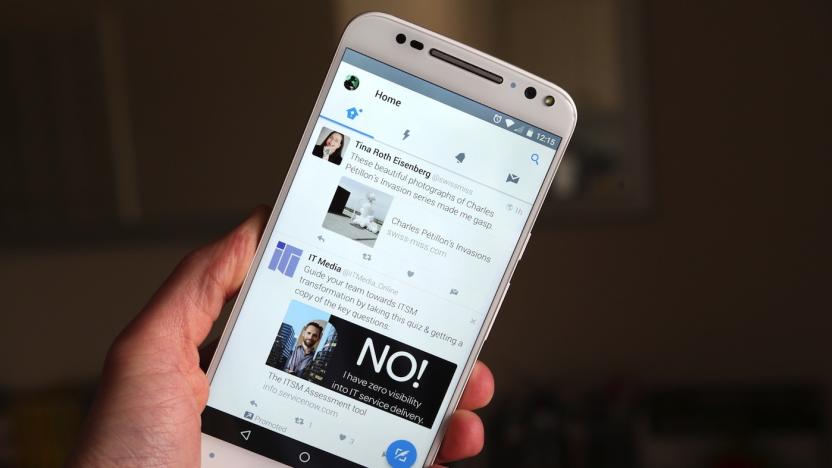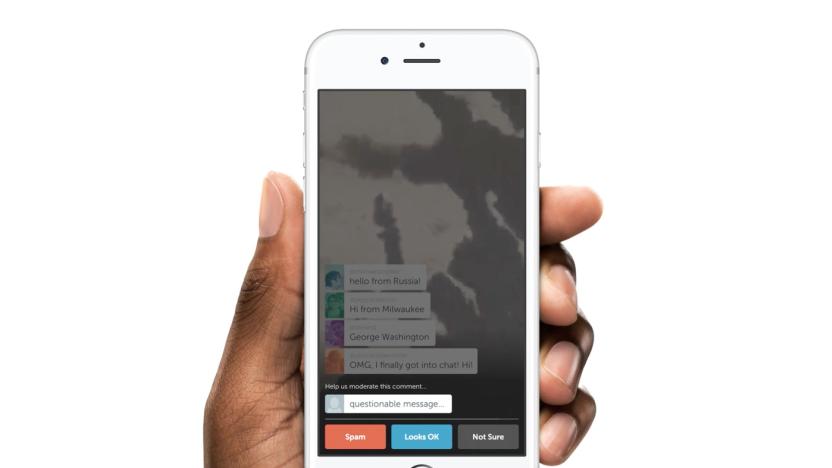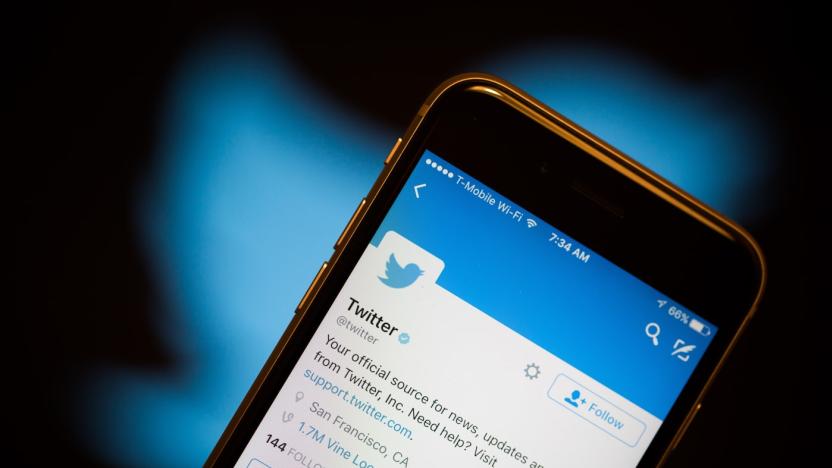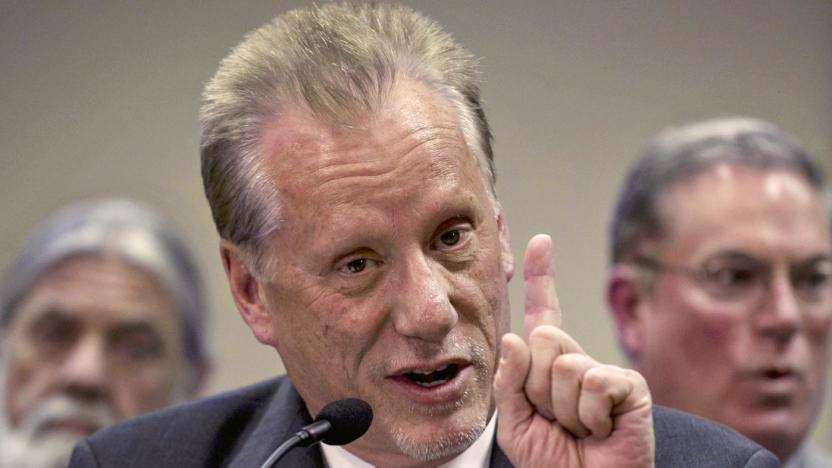abuse
Latest

Why is the Oculus founder trying to bring hateful memes offline?
Online abuse and bullying have existed as long as the internet has, but it's gone mainstream in a big way over the past few years. Perhaps not coincidentally, we've also spent the past year-plus subjected to Donald Trump's presidential campaign, an outing built on lies, harassment, intimidation and a whole host of other behavior not befitting a candidate for the country's highest office. These two trends collided late last week when it was revealed that Oculus VR founder and Facebook employee Palmer Luckey donated $10,000 to a pro-Trump group called Nimble America. The group's stated purpose is to prove that "shitposting is powerful and meme magic is real." Thus far, there's no evidence that Nimble America has been able to do anything aside from put up one insulting but fairly mild anti-Hillary Clinton billboard outside of Pittsburgh. Despite the group's lack of impact thus far, the fact that Luckey found Nimble America worth supporting shows just how widespread trolling has become.

Instagram lets anyone filter words out of comments
Instagram is making good on its promise to bring word filters to everyone. The photo-centric service has announced that anyone can now filter their comments to keep out abusive (or just plain annoying) feedback. If you're tired of dealing with harassment or "get more followers" spam, you won't have to spend ages blocking users or reporting individual comments. It's just a matter of choosing the right keywords to keep discussions civil.

Bad experiences on Facebook have real-world consequences
Researchers at Brown University believe that they have established a link between Facebook use and depression. The study examined 264 people and tracked if, and when, they reported having an NFE: a Negative Facebook Experience. When that data was boiled down, the team concluded that people who reported experiencing NFEs were 3.2 times more likely to risk suffering from the symptoms of depression.

Federal regulators crack down on social media abuse in nursing homes
According to a ProPublica report released late last year, documented cases of nursing home employees sharing abusive or degrading images of their residents on social media are on the rise. To combat the problem, federal health officials from the Centers for Medicare and Medicaid Services (CMS), which regulates nursing homes and assisted living facilities, have now asked state health departments to enact policies that prohibit employees from taking or sharing demeaning photos of residents.

Instagram is letting users filter words out of post comments
Twitter and Facebook have taken online harassment more seriously in 2016, though their approach is still light-handed, with the former taking years to finally ban one of its worst pitchfork-marshaling demagogues. Instead of coming down harder on moderation, Instagram is putting abuse-prevention in the hands of its users. They will soon be able to set up word filters, letting them control the tone of discussion below each image — or turn off comments in a post entirely. But is it enough to just let folks block triggering phrases?

Yahoo researchers built a powerful new online abuse detector
A team of researchers at Yahoo Labs have plumbed the depths of their company's massive comment sections to come up with something that might actually be useful for detecting and eventually curbing rampant online abuse. Using a first-of-its-kind data set built from offensive article comments flagged by Yahoo editors, the research team was able to develop an algorithm that, according Technology Review, is the best automated abuse filter built to date.

Twitter makes it easier to block abusers (updated)
Twitter has already taken a few steps to curb harassment, but what about the basic act of blocking someone? That's getting easier, too. The social network is introducing an improved blocking experience that takes away some of the headaches: just go to the offending tweet, choose Block from the "..." button and that person vanishes from your timeline. It's not going to get rid of systematic abuse (such as people who create dummy accounts or put you on targeted lists), but it will help you get back to your regular tweeting a little bit sooner. Update: Twitter has chimed in to explain exactly what's new. Before, people you'd blocked could still see what you wrote through quotes and retweets. Now, it's a complete vacuum -- block someone and they can't see anything you say, even if someone else is quoting you.

Periscope is using viewer juries to fight trolls
With most social internet services, getting rid of trolls is usually a matter of reporting a post or blocking the offender. But how do you do that in a fast-moving livestream service like Periscope? By asking viewers for help, that's how. Periscope has introduced a moderation system that creates "flash juries" whenever a comment is up for dispute. If someone flags a message as abuse or spam, a few random viewers are asked to vote on whether or not it's a problem. If the majority believes it is, the offender faces a minute-long ban on comments; a repeat offense mutes the person for the rest of the broadcast.

New study shows the scale of Twitter's misogyny problem
When then-CEO Dick Costolo admitted last year that Twitter "suck[s] at dealing with abuse and we've sucked at it for years," he was addressing the elephant in the room and a frustratingly common problem for women on the platform. Although the company has taken steps to combat abuse and report real-world threats, the overwhelmingly negative attitude towards women on Twitter persists. And a new study from the UK has the data to back it up.

Twitter lets you flag multiple abusive tweets in one report
Twitter has been continually improving the process for reporting abuse on the social channel, including simplifying the process a while back. The company is rolling out an update to the web, iOS and Android apps that will allow you to attach multiple tweets to the same abuse report. In other words, if there's a string of harassment, you can give a lot more detail without having to file multiple complaints. Twitter says this will not only give it more info on a report, but will also help resolve issues faster.

New York prescriptions go digital to combat opioid abuse
On March 27th, New York State residents will no longer need to decipher their doctor's terrible handwriting, thanks to a switch from paper to electronic prescriptions. The new phase is part of a 2012 law called I-Stop aimed at slowing the massive prescription medication addition problem. According to the state officials, the number of deaths related to Oxycodone, Hydrocodone and other opioid meds nearly quadrupled to 1,227 between 2004 and 2013.

UK issues new guidelines for punishing online trolls
Lawmakers in the UK are slowly coming to the realisation that online abuse can be just as damaging as its real-world equivalent. Last year, revenge porn became a specific crime, and the maximum prison sentence for internet trolls was increased from six months to two years. Acknowledging these serious cybercrimes is one thing, but it's also important to know what exactly constitutes a punishable offence. To this end, The Crown Prosecution Service is proposing an update to its Social Media Guidelines to help criminal prosecutors bring keyboard cowards to justice.

James Woods gets permission to sue his Twitter abuser
This week has already seen plenty of focus on Twitter's sometimes toxic culture, and now another high-profile victim is speaking out. James Woods has reportedly been given the go-ahead to launch a $10 million anti-defamation lawsuit against an anonymous Twitter user that suggested the actor used drugs. The case was expected to be thrown out by Judge Mel Recana at a hearing on February 2nd, but chose not to at the last minute. The Hollywood Reporter is claiming to have seen court documents saying that the statement was sufficiently factual not to be dismissed as Twitter hyperbole.

Twitter is setting up a safety council to tackle abuse
If there's one thing that's hampering Twitter's adoption in the wider world, it's that it's become a pretty toxic place for some people. The firm has decided to tackle this problem by announcing the formation of the Twitter Trust and Safety Council, a group tasked with reforming the service. The council's stated intention is to ensure the social network is a platform where "anyone, anywhere can express themselves safely and confidently." The site's head of global policy, Patricia Cartes, revealed that the body has recruited advocates from a wide network of advocacy groups. There are more than 40 listed contributors, many of which are legitimate anti-abuse organizations like GLAAD, the National Network to End Domestic Violence and the Samaritans.

Recommended Reading: The Jeep hack that led to a massive recall
Recommended Reading highlights the best long-form writing on technology and more in print and on the web. Some weeks, you'll also find short reviews of books that we think are worth your time. We hope you enjoy the read. Hackers Remotely Kill a Jeep on the Highway -- With Me in It by Andy Greenberg Wired This piece from Wired actually sparked a recall that affects 1.4 million Fiat Chrysler vehicles. During the test, hackers were able to use an exploit to "kill" the engine, disable the brakes and track location. Pretty scary stuff.

Women, LGBT least safe on Facebook, despite 'real name' policy
Despite Facebook's insistence that its "real names" policy keeps its users safe, a new report reveals that Facebook is the least safe place for women online. And things are turning more explosive, as stories emerge that Facebook has been changing its users' names without their consent -- and the company isn't allowing them to remove their real names from their accounts. Meanwhile, a furious LGBT coalition has rallied around the safety threats posed to its communities by the policy. Though, it was unsuccessful in blocking the company from marching in America's largest gay pride parade. Facebook's ongoing war on pseudonyms became well-documented in 2011 when a blogger risking her life to report on crime in Honduras was suspended by the company, under its rule requiring everyone to use their real name on the social network. The problem re-emerged in September 2014 when Facebook's policy locked an eye-opening number of LGBT accounts in violation of the "real names" rule. Facebook met with Bay Area LGBT community representatives, offered an apology, then suggested a policy change was in the works. Surprise: It never came. Nine months later, Facebook has failed to solidify or clarify this policy, and one organization has bad news for Facebook's years of "real name" policy implementation.

Twitter buys a machine learning company to better study your tweets
Twitter thrives on its ability to understand both your tweets and the hot topic of the day, and it needs every bit of help it can get -- including from computers. Accordingly, the social network just snapped up Whetlab, a startup that makes it easier to implement machine learning (aka a form of artificial intelligence). The two companies are shy about what the acquisition means besides an improvement to Twitter's "internal machine learning efforts." However, the likely focus is on highlighting the content that's most relevant to you based on your activity and who you follow, as well as hiding abusive tweets before you have to reach for the "block" option. Whetlab's technology could get the ball rolling on these robotic discovery techniques much faster than before, and give you a custom-tailored Twitter experience that requires little effort on your part.

Supreme Court: online threats must be intentional to be illegal
You can't be sent to prison for kinda sorta threats in the real world, and that now applies to the internet as well. The US Supreme Court has overturned the conviction in Anthony Elonis v. United States on the grounds that online threats aren't illegal unless they're clearly intentional -- not just that a "reasonable person" would see them as hostile. When Elonis raged against his ex-wife and the government through allegedly "therapeutic" rap lyrics on Facebook, the court says, it wasn't absolutely certain that he actually wished harm. The man isn't out of the woods yet (a lower court has to look at the case once again), but there's now a higher standard for putting him behind bars.

Trolls are using Twitter ads to push hate speech
As much as Twitter is doing to fight harassment lately, it's clear that ill-willed users are still slipping past the social network's defenses -- and sometimes, in very conspicuous ways. Users have spotted trolls using Twitter's promoted tweet ads to spread racist and anti-transgender messages, guaranteeing a wide audience for their hate. The company tells The Guardian that it's pulling these ads and suspending the offending accounts, but it's not offering an explanation for why these tweets got through despite policies that explicitly ban hateful language. The failures suggest that Twitter's ad approvals are relatively hands-off, and that it needs to keep a much closer eye on things so that its ads remain friendly. [Image credit: Señor Nejo, Flickr]

Twitter's broader abuse powers let it filter hostile tweets
Twitter knows that it's not enough just to make it easier to report abusive tweets. You have to catch and discourage that abuse as often as possible, too. Appropriately, the social network is rolling out a broader abuse policy alongside tools that help it stop harassment quickly. The new rules now cover all promotions of violence against someone, not just "direct, specific" threats -- Twitter can crack down on more than the most serious attacks. That's particularly important for victims of systematic abuse, who frequently chastise Twitter for being soft on people who clearly wish harm but aren't explicit about it.







